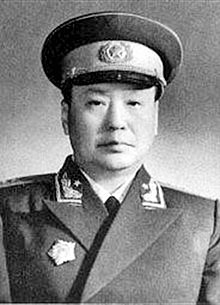
Back Ulanfu Czech Ulanhu German Ulanhu French Ulanhu ID Ulanhu Italian ウランフ Japanese Уланьфу Kazakh 우란푸 Korean Ulanhu NB Ulanhu Polish
Ulanhu | |
|---|---|
| ᠤᠯᠠᠭᠠᠨᠬᠦᠦ 乌兰夫 | |
 Ulanhu in 1955 | |
| Vice President of China | |
| In office 15 March 1983 – 15 March 1988 | |
| President | Li Xiannian |
| Leader | Deng Xiaoping |
| Preceded by | Soong Ching-ling and Dong Biwu (until 1972) vacant |
| Succeeded by | Wang Zhen |
| Head of the United Front Work Department | |
| In office 2 June 1977 – 26 April 1982 | |
| Preceded by | Li Dazhang |
| Succeeded by | Yang Jingren |
| Personal details | |
| Born | 23 December 1907 Tumed Left Banner, Suiyuan, Qing dynasty (present-day Hohhot, Inner Mongolia, China) |
| Died | 8 December 1988 (aged 80) Beijing, China |
| Political party | Chinese Communist Party |
| Spouse | Yun Liren |
| Alma mater | Moscow Sun Yat-sen University |
| Ulanhu | |||||||
|---|---|---|---|---|---|---|---|
| Chinese name | |||||||
| Traditional Chinese | 烏蘭夫 | ||||||
| Simplified Chinese | 乌兰夫 | ||||||
| Literal meaning | Red son (in Mongolian) | ||||||
| |||||||
| Chinese name | |||||||
| Traditional Chinese | 雲澤 | ||||||
| Simplified Chinese | 云泽 | ||||||
| |||||||
| Mongolian name | |||||||
| Mongolian Cyrillic | Улаанхүү | ||||||
| Mongolian script | ᠤᠯᠠᠭᠠᠨᠬᠦᠦ | ||||||
| |||||||
Ulanhu or Ulanfu (Chinese: 乌兰夫; pinyin: Wūlánfū; 23 December 1907 – 8 December 1988), born Yun Ze (Chinese: 云泽),[1] was the founding Chairman of China's Inner Mongolia Autonomous Region, serving from 1947 to 1966.
An ethnic Tumed Mongol, he took the nom de guerre Ulanhu (lit. 'Red son')[2] and had the nickname of "Mongol Prince” during his political career. He served as Vice-Premier between 1956 and 1966. He was purged during the Cultural Revolution but later reinstated. Between 1983 and 1988 he held the office of Vice President of China.
Ulanhu was the highest-ranking minority official in PRC history, and became an icon of loyalty both to the Mongolian people and to the PRC.[3] Except for the period of the Cultural Revolution, his family dominated the politics of Inner Mongolia.[4] His son Buhe served as Chairman of Inner Mongolia for a decade, and his granddaughter Bu Xiaolin was appointed to the same position in 2016.
- ^ Pirie, Fernanda; Huber, Toni (31 July 2008). Conflict and Social Order in Tibet and Inner Asia. BRILL. ISBN 978-90-474-4259-2.
- ^ Pirie, Fernanda; Huber, Toni (31 July 2008). Conflict and Social Order in Tibet and Inner Asia. BRILL. ISBN 978-90-474-4259-2.
- ^ Gries, Peter Hays; Rosen, Stanley (2004). State and Society in 21st Century China: Crisis, Contention, and Legitimation. Psychology Press. p. 228. ISBN 978-0-415-33204-0.
- ^ Bulag, Uradyn Erden (2002). The Mongols at China's Edge: History and the Politics of National Unity. Rowman & Littlefield. pp. 213–4. ISBN 978-0-7425-1144-6.
© MMXXIII Rich X Search. We shall prevail. All rights reserved. Rich X Search